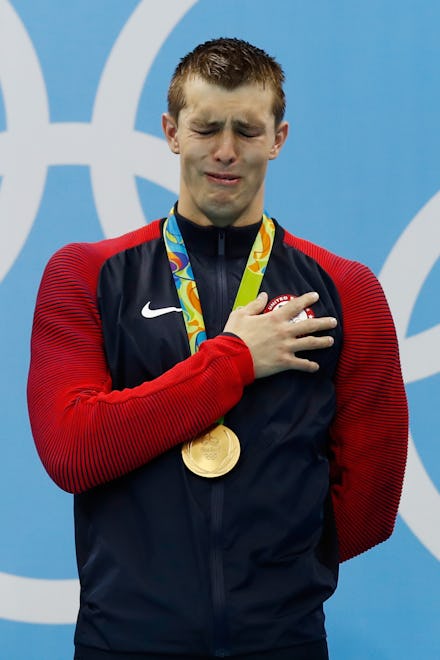Ryan Held Proved It's OK For Men to Cry — But Why Do We Still Need to Learn That Lesson?

On Sunday, 21-year old swimmer Ryan Held raced the third leg of the men's 4×100 freestyle relay and helped the United States team take home the gold, along with fellow medalists Caeleb Dressel, Nathan Adrian and Michael Phelps. Notably, Held sobbed when the American national anthem played, standing beside his teammates draped in gold medals.
"I've heard the National Anthem 100 times and as soon as that played, it was just something different, tears started rolling down my face," Held told Mic in an email via the swim team's communication manager. Encouraged by his teammates, Held said Phelps and Adrian are great team leaders who encouraged him to "let the emotions fill you."
Americans swooned over Held's show of sensitivity, catapulting the North Carolina college student from burgeoning athlete to overnight sex symbol. But when it comes to outward displays of emotion, men face a double-edged sword: they're either emasculated (the way fans taunt basketball player LeBron James and call him a cry baby), or their tears are considered a show of exceptional sensitivity, earning them effusive praise.
It is not remarkable to cry after a big win; in fact, it's a natural response to such a big moment. But the flood of praise Held inspired is undoubtedly colored by gendered expectations — people were excited about the tears because he is a man.
For the sake of comparison, female athletes are rarely applauded for showing similar emotion after a big game. Last October, women wrestlers of the WWE were criticized for their celebratory tears. Similarly, in 2014, the US women's hockey team was mocked for tearing up after a devastating loss.
While women might experience sexist criticism if they expose authentic emotions, it's still more common to see female athletes cry at the Olympics. According to a survey of 2012 Olympic footage by the Wall Street Journal, 24.6% of female athletes cried, compared to 8.3% of their male peers.
This gap suggests there are still lingering stereotypes associated with how we expect people to express emotion in public — and these stereotypes are entirely based on gender.
As S.L. Young wrote for the Huffington Post, many people still see tears as a sign that a man is "weak, effeminate, or gay." Challenging these stereotypes would require sports professionals to deliberately normalize public displays of emotion.
Male athletes in particular would have a lot to gain from that type of cultural shift. A study of collegiate football players and their ideas about crying, published by the journal Psychology of Men & Masculinity, found that athletes benefited most from coaches who encourage the team to express their feelings.
"Overall, college football players who strive to be stronger and are emotionally expressive are more likely to have a mental edge on and off the field," study co-author Jesse Steinfeldt said in the American Psychological Association press release.
Hopefully, Held's victory will inspire more than just effusive praise from fangirls. It should encourage men to openly share their feelings as well, provided we don't start fetishizing men who show their feelings. Because in a perfect world, the only thing unique and exceptional about Held's weekend would be his swimming performance — not how he reacted to his win afterwards.